Trinity Whitley was well on her way to being a poster child for women in ministry in Baptist life.
Raised a Baptist pastor’s kid. Trained in a Baptist seminary. A firm calling to pastoral leadership.
But while the calling part came true, the Baptist part did not.
“I was never ordained in a Baptist church,” says Whitley, the associate pastor at Faith Presbyterian Church in Tallahassee, Florida.
While finding her initial home and training in Cooperative Baptist Fellowship circles, it was in and through the Presbyterian Church USA that Whitley found her footing and voice in pastoral ministry.
“CBF is still doing really good work,” Whitley says. “That’s just not where I am anymore.”
‘So many more choices’
The fact is, that’s where a lot of other Baptist-called and Baptist-trained ministers aren’t anymore.
Experts report a growing trend of denominational swapping among clergy. In fact, there is a name for it: switching. And, like anything else under the sun, it isn’t all that new.
“Almost from the beginning there has been switching because there have been so many denominational choices in the U.S.,” says Bill Leonard, founding dean and professor of divinity emeritus at Wake Forest University’s School of Divinity.

Bill Leonard
The long-standing trend is not limited to Baptists, he says. Sometimes, the move is the other way, as clergy in other faith traditions migrate to Baptist denominations.
Still, there are notable examples of Baptists departing for other groups throughout the nation’s history. Many Baptists today may recall John Claypool’s high-profile move to the Episcopal Church during the 1970s, Leonard notes.
“We had a joke that if you scratch an Episcopalian, four or five out of 10 will bleed Baptist.”
Leonard believes such movements are picking up, driven by economic, social and theological considerations.
Sometimes switching is driven by cultural issues, such as women in ministry and LGBTQ inclusion.
“As denominations have declined and become more rigid and doctrinaire, people have gone looking for opportunities in denominations that seem more compatible,” Leonard says.
There are also generational shifts – the same ones behind the decline of religious identity and church loyalty.
“This generation is looking around,” he says. “More people are open to (switching) in part because younger generations of ministers weren’t necessarily raised in the old denominational loyalty.”
‘I do not feel any bitterness’
For Whitley, it was a bit of all those factors.
Growing up Southern Baptist, she found a spiritual home after a positive, female-led campus ministry experience in college.
A sense of calling to serve the local church emerged and led her to the Gardner-Webb University School of Divinity with all the spiritual, emotional and financial support that came with being a CBF National Leadership Scholar.
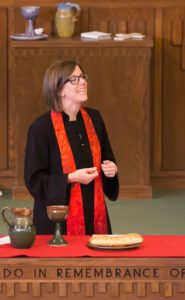
Trinity Whitley
Her calling to pastoral ministry crystallized during her theological studies.
“I loved my preaching class at Gardner-Webb,” she recalls.
After graduation she was serving children and youth at a church dually aligned with CBF and the SBC.
“I was feeling a desire to be ordained but … the congregation didn’t offer to ordain me.”
Whitley was also beginning to reconsider some Baptist practices. She remembers a Methodist who could not join her church unless first agreeing to be re-baptized.
“I had never really examined that, and I really began to have this crisis of understanding of what baptism is.”
Whitley also was becoming increasingly “heartbroken” with the practice of barring children and youth from the Lord’s Supper prior to their baptism.
“I feel children learn through full inclusion in the church, including communion,” Whitley says. “But in the Baptist church in general you have to be baptized first.”
And then there was the matter of inclusion of gays and lesbians.
“I was not 100 percent sure where I stood on LGBTQ issues, but I didn’t feel sexuality should keep you from membership and ordination.”
In 2012, Whitley was hired for a non-ordained position at the Presbyterian church she now serves. She was ordained in 2016, and after serving in other capacities became associate pastor in 2017.
It wasn’t anger or judgment that inspired the switch.
“I do not feel any bitterness.”
‘More welcoming and affirming of women’
Pam Durso hears of stories like Whitley’s all too often.
CBF “has lost a generation of women,” says Durso, the executive director of Baptist Women in Ministry, in an e-mail to BNG.
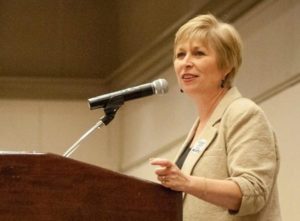
Pam Durso
“The number of women ministers/ leaders who are now active in CBF and who are 45 to 65 years old is much smaller than the number of men in that age group.”
The precise numbers are elusive, she says.
“It’s hard enough to track women who have stayed.”
Anecdotal evidence suggests female ministers are leaving moderate Baptist churches in significant numbers.
“Based on conversations I have had, I would say Baptists – (Southern, CBF, American) have lost hundreds if not thousands of women ministers in the past 40 years,” Durso says.
Switching wasn’t anecdotal for Merianna Neely Harrelson, a former CBF minister and the pastor of Garden of Grace United Church of Christ in Columbia, South Carolina, since January.
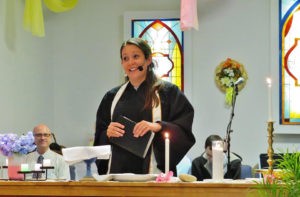
Merianna Neely Harrelson
She describes her recent transition as a relief after years of struggling as a woman in Baptist ministry.
“The whole feel of the UCC is much more welcoming and affirming of women.”
Harrelson previously pastored churches affiliated with CBF South Carolina, which she describes as very supportive of her calling. She also praises the Baptist congregations she previously served.
But outside those contexts, respect in broader CBF life was hard to find.
“As a woman in ministry in a Baptist context there is a lot I had to fight against the past seven years. You continually have to advocate and defend yourself, your leadership skills and your experience.”
‘I was approached by a religious headhunter’
Women and Baptists aren’t the only ones switching. Consultants and other ministers with first-hand experience say such departures, by either gender, are flourishing across multiple denominations.
“I would say it is much more frequent now than it was 10 years ago, whether it’s leaving the Baptist church or someone coming into the Baptist church,” says William Vanderbloemen, founder and CEO of Vanderbloemen, an agency that conducts executive pastor searches for churches.

William Vanderbloemen
Religious organizations increasingly are searching outside traditional circles for qualified pastoral leadership, he adds.
“It gets harder and harder to say we have to have someone from our own family.”
But differences in style, theological bent and priorities can be a challenge.
“When we are doing a search for a church, it’s often like doing a heart transplant,” he says. “We are asking an outsider to come inside the body and run the operations of the church.”
That may be relatively smooth in non-denominational settings, but trickier for others.
“And that’s often a big question for Baptists: is this a tissue match? You can put a healthy heart into a healthy body and it does not end well.”
Culture is one reason.
“It’s hard for me to take someone from the deep South and put them in Seattle, even if it’s a Southern Baptist going to a Southern Baptist church.”
Alan Rudnick, an American Baptist minister, has been that transplant during his career.
He briefly served a Presbyterian church during his time in seminary and toward the end of his studies was contacted about an opportunity at an United Methodist congregation.
“I was approached by a recruiter who was a religious headhunter,” says Rudnick.
“I was an American Baptist serving in the United Methodist Church for three years.”
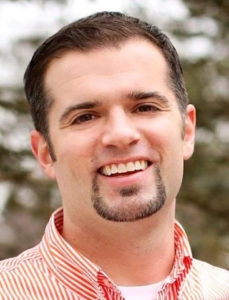
Alan Rudnick
Rudnick subsequently found it challenging to return to Baptist life.
“There was apprehension with some churches,” he says. “They were wondering, ‘how Baptist is he?’”
Today, Rudnick maintains his ABC-USA and CBF connections while serving as the associate and executive pastor at DeWitt Community Church in Syracuse, New York. Previously, he was the pastor at First Baptist Church in Ballston Spa, New York.
Rudnick adds that it’s often smart for ministers to keep an eye on opportunities outside their current denominational contexts.
“Churches are declining and closing,” he says. “To stay within one’s own denomination can be very self-limiting.”
‘That’s bonkers’
Making the switch can take some getting used to. For Baptist-trained ministers it can mean adjusting to baptizing infants, using written prayers or donning robes for worship, says Jacob Snowden, a Baptist-turned-Presbyterian minister.
“We don’t have a baptistery, we have a font,” says Snowden, the director of Christian education at First Central Presbyterian Church in Abilene, Texas.
Snowden grew up Baptist in Dallas and earned degrees at Hardin-Simmons University and its School of Theology before studying at the Boston University School of Theology. Yet, he found the Presbyterian Church to be a good cultural and theological fit going forward.
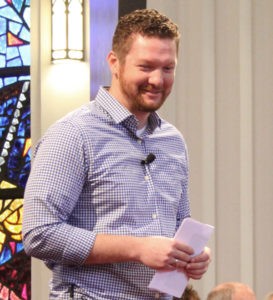
Jacob Snowden
And the “Calvin thing” wasn’t an issue, he explains.
“I generally don’t like Calvin and you don’t have to be a Calvinist to be a Presbyterian,” he says.
“I experienced more hardline, non-graceful Calvinism in the evangelical and non-denominational – and some Baptist churches – than I ever did in Presbyterian life.”
Snowden says he also has come to appreciate the denomination’s openness to women in ministry and the structure that nurtures that stance.
“(Baptist) seminaries can have all the conferences they want and issue statements on women and equality, but who is there to enforce that?”
Uniformity in other beliefs has also been a welcome change from the differences that can be found in Baptist churches.
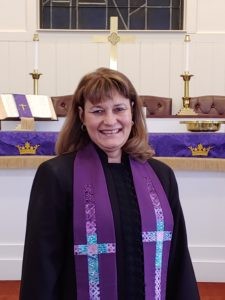
Lynnette Sills
“I don’t want to spend a career having to closet the fact I am not a new-earth creationist. That’s bonkers,” he says.
Just as objectionable for some is the idea of having to fight just to fulfill their callings.
“I don’t have time to do that,” says Lynnette Sills. “I applaud and support those who do.”
Last July, Sills became the pastor at Tryon United Methodist Church in Tryon, North Carolina.
Her prior time in CBF life was meaningful and she was always supported. But Sills says she had little chance of ever becoming a pastor because she is a divorced mom.
But it was a non-issue when interviewing with the United Methodist Church. “They looked at me and said why are you even bringing that up?”
‘CBF gave us a home’
Keith Herron’s 2014 move to the United Church of Christ was mostly about seeking a better fit in ministry in a context that echoes some Baptist traditions.
“They recognize the autonomy of the local church and believe in church and soul freedom,” says Herron, a former pastor and national CBF moderator. “It was not a rejection of CBF, but an embrace of what the United Church of Christ is about.”
What it is all about, he says, is being a welcoming place to all.
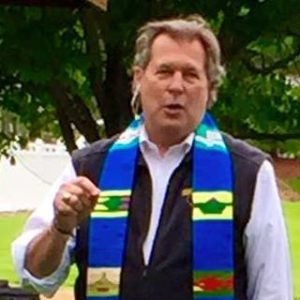
Keith Herron
“The UCC is more embracing of gays and lesbians. It was part of my decision,” he says.
“I wish and want for the church to be as open as I think God is open and, to me, that is a big deal to be in a church that welcomes all persons.”
Herron, now retired as the senior minister at St. Lucas United Church of Christ in St. Louis, Missouri, says his switch was in some ways a continuation of his – and so many others’ – departure from the SBC.
“We joked about being refugees from fundamentalism,” Herron says.
In a sense, those who left to join CBF also have switched, he adds.
“We could have all ended up as Disciples (of Christ) or UCC or Methodist but CBF gave us a home.”
But for some, the grass is greener on the Baptist side, says Austin Carty, the senior pastor at First Baptist Church in Corbin, Kentucky.
Carty grew up in a non-denominational house-church tradition, which he says is about as unstructured and nondenominational as Christianity can get.
In Baptist life, Carty says he found the congregational autonomy and accountability he needed.
“To me, the Baptist culture, and traditional, rooted Baptist churches have just enough order and organization but not too much for a minister like me,” he explains.
“There is polity in place. No one can become the charismatic leader figure that controls the board. There is institutional memory there and structure.”
